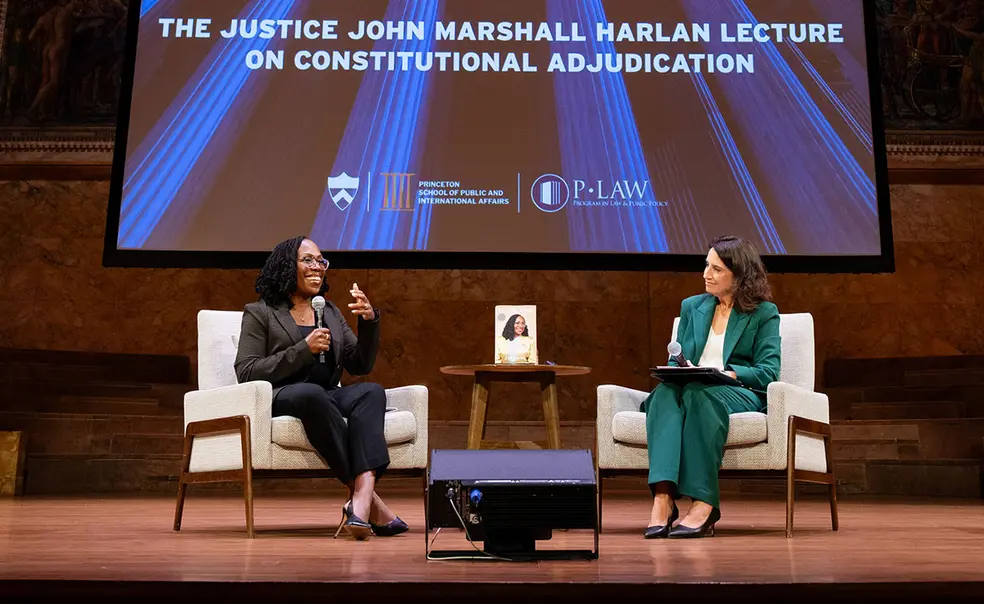Justice Ketanji Brown Jackson Describes Her Fight Against Injustice
In a talk on campus, Jackson discussed her new memoir and highlighted lessons from her mother
Supreme Court Justice Ketanji Brown Jackson, speaking on campus Sept. 10, said that her parents — who grew up in the segregated South — gave her the confidence to fight injustice and navigate the challenges she has faced in her career.
“Part of my mother’s lesson was, you’re going to see the injustices, you may even face them, but you have to understand that focusing on them will end up, at times, taking you away from the work, which is really the most important thing,” she told Deborah Pearlstein, director of the Princeton Program in Law and Public Policy. She explained how her mother helped her learn to choose her battles.
Jackson spoke about her new memoir Lovely One, which describes her path to becoming the first Black woman to serve on the nation’s highest court.
One injustice she discussed in her talk happened during her sophomore year at Harvard, when someone in the main area of the quad where she lived put up a Confederate flag. “You have to remember that the very serious function of racism is distraction, that it keeps you from doing your work,” Jackson recalled her mother saying. She remembered repeating this at a Black Students Association meeting, which she said was helpful for the group to continue its advocacy despite the circumstances.
Later, as an assistant special counsel to the United States Sentencing Commission, she fought to bridge disparities between sentences for drug offenses related to crack and powder cocaine, despite knowing it could jeopardize her chances of becoming appointed as a judge. After Congress changed the mandatory minimum, she worked to have sentences revised for people who had been convicted under the previous guidelines, who were predominately Black. While the commission was bipartisan, she worried about being too forceful with her approach. She delivered a passionate speech on the topic, which she said may have contributed to her appointment as a U.S. district judge in 2012.
Jackson said among her most prized possessions is a copy of a petition filed to the Supreme Court by Clarence Gideon, a poor man who was charged with breaking and entering but was denied court-appointed counsel. He was convicted, but on appeal in 1963, the Supreme Court issued a landmark ruling that any criminal defendant who can’t afford a lawyer be provided one. Jackson said as a former public defender, she understood the significance of his case.
When asked about the Supreme Court’s emergency docket, used to address applications that seek immediate action, and the Trump administration’s frequent use of that process, Jackson said, “I think it’s hard to look at the emergency docket and glean anything right now ... about the nature of the court.”
When Pearlstein asked Jackson what she wanted people to take away from her book, she replied that Pearlstein was the first to ask her that question. “I want people to know how grateful and privileged I am in the archive of history,” she said. She reminisced on starting the book with her grandparents, who grew up in rural Georgia, and who never had the chance to graduate high school, and about her parents being first-generation college graduates.
In her talk, she highlighted the influence of Constance Baker Motley, the first Black woman appointed to the federal bench, and how Motley’s career inspired her not just to be a lawyer, but a judge.
She praised Motley, who was born 49 years to the day before she was and became the first Black woman to argue in front of the Supreme Court, winning a large majority of her cases. “I hope that I’m inspiring other young people who grew up going to public high school somewhere, who are first or second generations in their family, to do the things that they are passionate about and hopefully succeed,” she said.
Jackson spoke as a part of the John Marshall Harlan Class of 1920 Lecture in Constitutional Adjudication, which celebrates the legacy of John Marshal Harlan, the eighth U.S. Supreme Court justice to graduate from Princeton. Current Justices Samuel A. Alito Jr. ’72, Sonia Sotomayor ’76, and Elena Kagan ’81 are the ninth, 10th, and 11th, respectively.
Jackson was the third justice to visit Princeton this year. In April, Sotomayor spoke on campus the afternoon before 36 University Place was named in her honor. In February, Kagan received the Woodrow Wilson Award, which honors an alum who embodies “Princeton in the Nation’s Service” on Alumni Day.












No responses yet